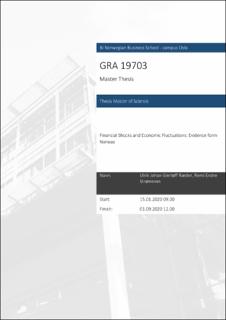Financial Shocks and Economic Fluctuations: Evidence form Norway
Master thesis
Permanent lenke
https://hdl.handle.net/11250/2688628Utgivelsesdato
2020Metadata
Vis full innførselSamlinger
- Master of Science [1621]
Sammendrag
In this paper, we evaluate the importance of shocks originating in the financial
sector on the Norwegian macroeconomic variables. We estimate demand, supply,
monetary policy, investment, and financial shocks in a Bayesian VAR model with
sign restrictions. We run three different setups. Firstly, the baseline model is
estimated where we find that financial shocks are an important driver for
investment and stock prices in the short-run and for the interest rate in the longrun.
Moreover, financial shocks explain a limited share of the fluctuations in
output and prices across all horizons. Surprisingly, monetary policy shocks are an
important driver across all variables. By disentangling the financial shock into a
credit and housing shock, we find that housing shocks have a dominant role in
explaining the fluctuations in the variables, while the credit shocks are negligible.
Lastly, the exchange rate model is estimated, where we look at how shocks from
the baseline model can explain the fluctuations in the exchange rate. The results
show that monetary policy shocks are the main driver for explaining the shortterm
fluctuations, while investment shocks become the main driver in the long
run.
Beskrivelse
Masteroppgave(MSc) in Master of Business - Handelshøyskolen BI, 2020
